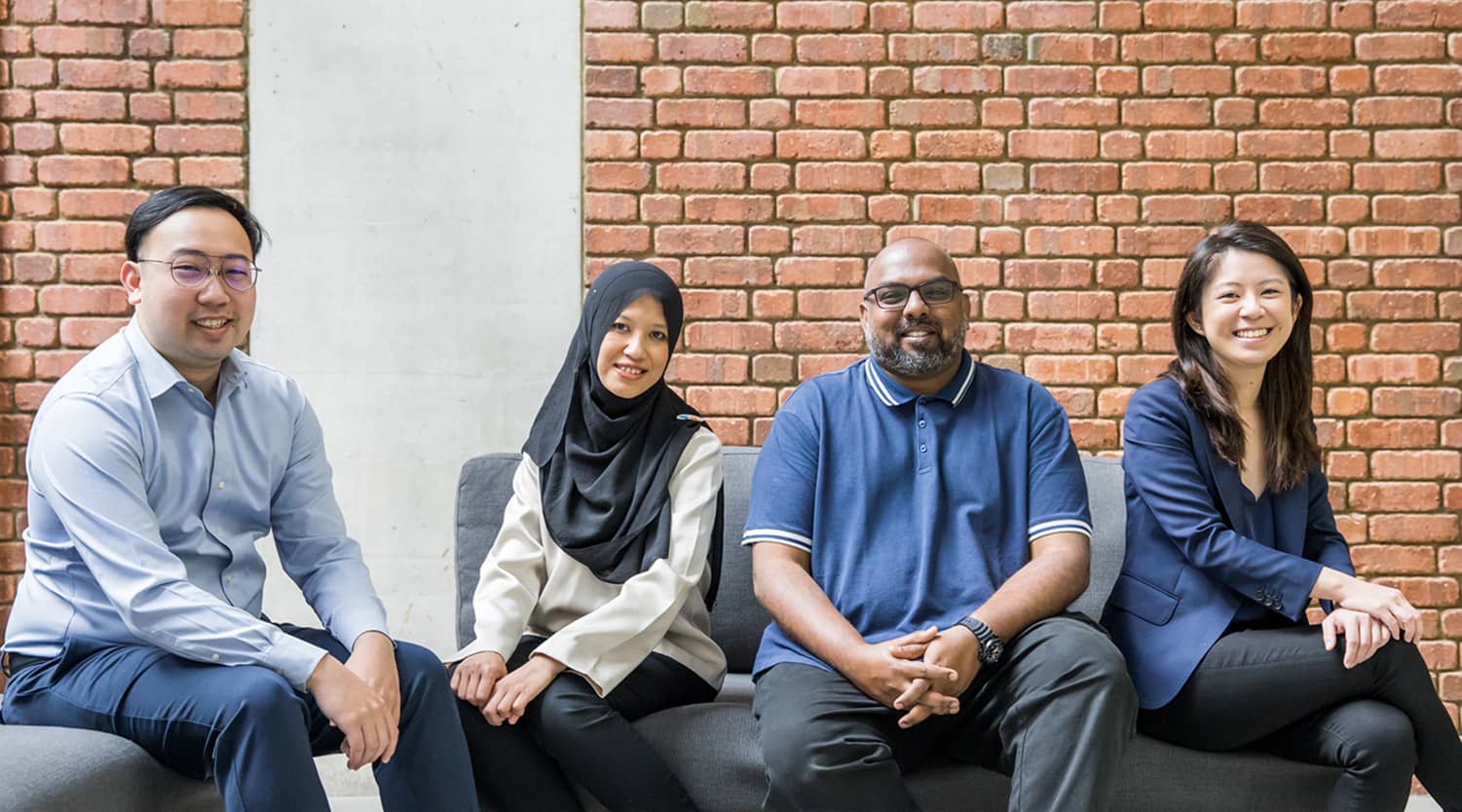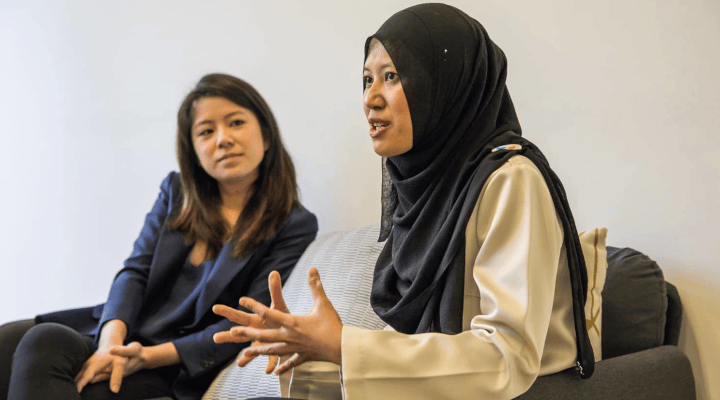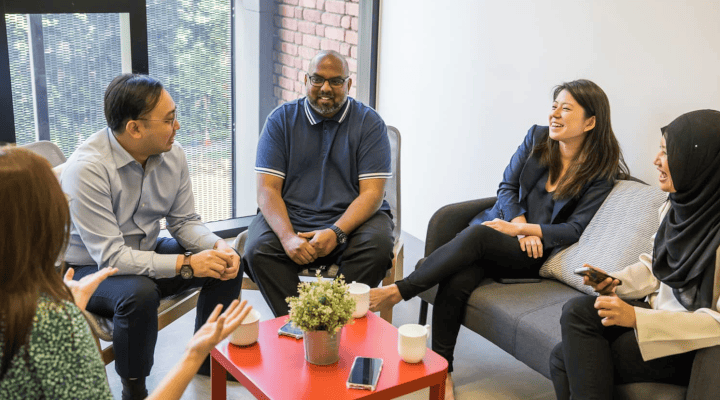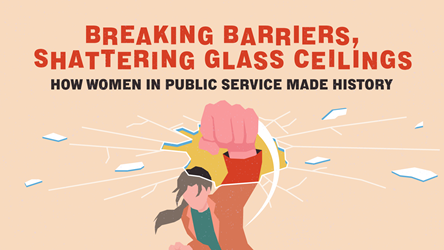“It’s Not Just About Tolerating One Another”: Building Interfaith Harmony in Singapore

THE SPEAKERS (L-R):
Leonard Sim is a Country Officer (Europe Directorate) at the Ministry of Foreign Affairs. He is also the President of hash.peace, a youth-led advocacy group that develops programmes for sustainable social harmony. He has been a member of the Eunos Harmony Circles since 2022.
Siti Nuraini Asmuri is a Senior District Lead (Policy Engagement) at MUIS. She has been a member of the Kebun Baru Harmony Circles since 2017.
Sasitheran Rama Moorthy is an Assistant Manager (Innovation) at the Infocomm and Media Development Authority. He has been a member of the Jurong Spring Harmony Circles since 2019.
Donna Yeo works in the Policy Advisory Division at the Ministry of Law. Since 2020, she has also been a volunteer with Being Bridges, a social enterprise that conducts programmes for interfaith, interracial and intercultural diversity.
Disclaimer: The opinions expressed by the public officers in this article are their own, and do not necessarily represent the views of their respective agencies or the organisations they volunteer with.
What Does Interfaith Harmony Mean to You?
Donna: When I think of harmony, I think of music and the different instruments in an orchestra. Everyone’s playing [a different score] yet playing together to create something very beautiful.
With interfaith harmony, you’re talking about different religions, beliefs and values. It’s not about trying to change people so that everyone has the same belief. It’s more of trying to create something beautiful together while honouring and respecting something that's so deeply held by each person.
Leonard: Adding on, I think we shouldn't also be placing an overemphasis on the word “faith” itself.
Many people in Singapore do not practise any specific religion or faith. So to me, interfaith harmony is not only looking at faith, but also how we can include people who are agnostic, atheist, spiritual but not religious, and so on.
Sasi: It’s not just about tolerating one another. Harmony transcends tolerance, encompassing compassion and profound respect for one another's beliefs. It is a celebration of our shared values.

Why Is Interfaith Harmony or Your Interfaith Work Important to You Personally?
Leonard: To me, it's important because my family is interfaith. I have a grandmother who, many years ago, was a Buddhist, then became a Taoist and is now a Catholic. But my grandfather has never changed his faith. He remains a Taoist throughout.
How they manage that in their relationship is a very interesting experience. You have to live together in harmony. How do you make it work?
Sasi: The uniquely Singaporean society that we currently live in did not come easy. Our forefathers made significant sacrifices, relinquishing long-held traditions, to pave the way for the modern lives we enjoy today.
The previous generation witnessed these sacrifices first-hand. We have learnt about them through accounts passed down. But if we fail to consistently share this narrative with coming generations, the essence and significance of these sacrifices may eventually fade away.
My volunteer work is important to me as it allows me to actively participate in the ongoing conversation. This way, I can pass the story on to the next generation and help to preserve the connection to our collective history.
What Memorable Incidents or Interactions Have Influenced Your Beliefs or Perception of Interfaith Harmony?
Sasi: For almost 25 years now, my parents have held celebrations during the auspicious Hindu month of Aadi, where we offer traditional porridge to the Goddess. At the height of it, our celebrations used to attract nearly a thousand people from across the island.
I recall an incident from about 10 years ago, an individual from a different background unexpectedly entered our prayer hall and started spurting derogatory insults. The atmosphere immediately grew tense. In that heated moment, my father calmly asked, "Are you feeling okay? Please come in for lunch."
That day, my father taught me the importance of rising above the urge to retaliate. Instead, responding with love and compassion, even when faced with disrespect and negativity.
Nuraini: I used to work in a mosque in Bukit Panjang. Every year during the seventh month, there would be a getai (a live performance held during the Hungry Ghost Festival) at the field opposite the mosque. Each year, the organisers engage the mosque to understand our prayer times so that they can plan their event. They would only start their music after our prayer times.
This happened some 20 years ago. Hence harmony had already existed, but we regarded it as just a friendly gesture of respect and did not take it as an opportunity to have a deeper conversation on interfaith practices and their significance. But now that we can openly have conversations about interfaith – I think we should take this opportunity to, like what Leonard mentioned, bring this to a different level.
Donna: I like what you said about having these conversations. We’re all here today, having already experienced [interfaith dialogue] through different platforms – how do we have these conversations happen without a formalised setting? How do we create spaces where it's safe to ask questions that might, perhaps, be triggering in public spaces?

What Are Some Challenges You've Faced in Doing Interfaith Work?
Leonard: The biggest challenge that hash.peace faces – and I'm sure many other interfaith organisations also face – is not so much about inter-faith, but intra-faith.
With interfaith, people usually accept that you are of a different religion, and that you have different beliefs. People are more okay with that because you don't claim to be from the same religion.
But the big challenge is when you have people from the same religion, from different sects or different teachings that don't see eye to eye. Sometimes they don't even want to be in the same room together.
To me, they're all religious people with different beliefs that need to be respected. But if they don't talk to each other, how do you then start building harmony?
Nuraini: I think it's about adaptation and managing stereotypes. As a Muslim, there are some things that are practiced in other countries, but are not doable in Singapore.
A good example is the call of prayer from the mosque. For Muslims, we would like to make it audible so that everyone can hear it and observe timely prayer. But within residential estates, we live with people of different belief systems. Loud prayer calls early in the morning, for example, may not sit well with others.
To be tolerant, we have to understand how others perceive our practices, and then find a common ground so that everybody can live together. So that's where harmony comes in: Being able to respect, accept and adapt to the differences that we have.
Donna: I think the challenge in interfaith conversations at the personal level is something slightly beneath the surface that prevents people from being able to say what they feel or think.
My goal [when I facilitate] is for every party to feel they can speak up and say: “Okay, this is my perspective. Some might say it's a view that is old-fashioned, but I am not afraid to express it.” Others may or may not agree [with any of the views], but each person has a legitimate voice here [in this conversation].
How Do You Think More People Can Get Involved in Interfaith Harmony Causes? How Can These Causes Be Better Supported?
Nuraini: I think we should look at it not just from the perspective of “faith” but from the position of celebrating each other’s belief systems and practices.
Donna: Partnerships with different groups. For example, I recall the Diversity by Default game was included as part of a National Museum program. People who might not actively seek out interfaith dialogue might join the event for other reasons, and then take part in the conversation.
The nature of the conversation can be quite different, quite shocking [for some], but if it's done well, individuals might want to participate in such conversations again or find other [interfaith] events.
Diversity by Default = a card game developed by Singaporean company Starknicked. Its aim is to create meaningful conversations revolving around race, religion, nationality, ethnicity, disability and mental health.
Leonard: It's a lot of marketing. Sometimes we try to find topics that appeal to different target audiences and see if they come. Sometimes we will intentionally put more provocative things, like “Let's talk about death”. A lot of young people will show up to such conversations to understand the different perspectives.

Donna: Do you use TikTok and other social media platforms?
Sasi: While I personally haven't used those, I think we should. Our encounters with faith and interfaith experiences have been largely through the traditional channels, such as our grandparents, parents and religious leaders.
Today, information – true or fake – is readily available. This means anyone can quickly form an idea or opinion [without engaging with the information]. People may perceive interfaith as dull or irrelevant and avoid any involvement [in it].
By using platforms like TikTok, presenting messages in a relatable manner and inviting people to be part of the conversation, we might see more involvement [in the interfaith space].
Leonard: Sometimes we’ll see people who say that they're afraid to talk about interfaith matters because they're not a religious leader, for example.
Often we find that what works is when people share their own experiences within the belief system they have, and start to bounce off each other in conversation. Like, “Oh, I do this also, but I do it for this reason. You practise that? I do something similar.”
You don't need to have [such a deep] level of religious knowledge, like a religious leader. But I guess that's always a barrier. People don't want to talk about their religion in case they feel like they might misrepresent certain things.
That's where our role as facilitators comes in. How do we make that space open? How do we make that space feel safe for these participants to want to share about their experience? We have had some successes, but of course the biggest challenge is always getting somebody to step into the room.
Donna: Earlier we talked about being invited to [religious festive] events. For myself, I've never invited anyone to attend church with me, and that could be a starting point. For example, I’ve attended an interfaith iftar (an evening meal to breakfast during the Islamic month of Ramadan) – it’s a new experience for someone [outside the faith] that can be a gentle introduction to the religion and a springboard for deeper discussion. If I’m first friends with someone, then I might feel close enough to invite or introduce them to interfaith events, encounters and conversations.
Upcoming Racial & Religious Harmony Celebrations
Celebrate racial and religious harmony with your family and friends by checking out these events this July!
1. Harmony Sports Fiesta (22-23 July)
Put on your sporting attire and get active at the inaugural Harmony Sports Fiesta! This fiesta offers an array of interactive game booths and food stalls reflecting the multicultural makeup of Singapore. Head over to this website for event details and highlights.
2. Soundscapes of Religions in Singapore (22 July)
“What does religion sound like?” Step into the vibrant and diverse religious tapestry of Singapore through the immersive "Soundscapes of Religions in Singapore" programme to find out.
Join guided tours with knowledgeable interfaith guides, delving into the acoustic environment of Singapore's diverse religious landscape, and encounter a variety of religious sounds such as Christian hymns and Sikh kirtan. Sign up here. (Limited slots!)
3. Let’s Walk – Celebrate Harmony at the Heritage Institutions (22-23 July)
Take a walk at two of NHB’s Heritage Institutions this Racial Harmony Day and join in celebrating harmony through movements and journeys. Put on a different lens to experience a variety of cultural programmes, free drop-in activities and live performances which will give you a deeper understanding of Singapore’s multicultural roots. Find out more here.
Watch this space for live updates on events you can get involved in.

To get more stories like this, subscribe to the Challenge Telegram channel.
- POSTED ON
Jul 13, 2023
- TEXT BY
Hidayah Md Sham
- PHOTOS BY
Norman Ng









